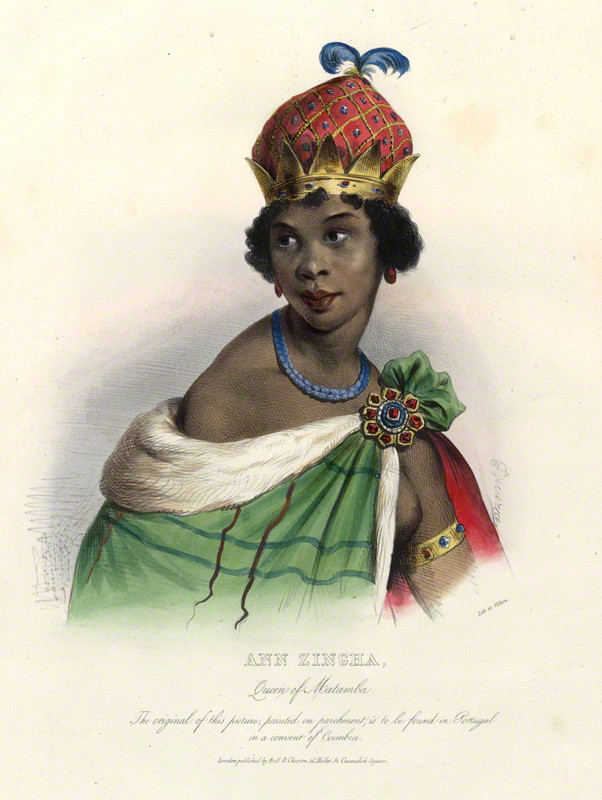
Queen Nzinga/Kujinga of the Mbundu people was born around 1583 into the royal family of Ndongo in present-day northern Angola. She was the daughter of Ngola (King) Kilombo of Ndongo and Kengela ka Nkombe, one of her father's slave wives and his favourite concubine. She was a resilient leader who fought against the Portuguese and their expanding slave trade in Central Africa.
According to legend, her birth process was difficult. She was born with the umbilical cord wrapped around her neck. That is how she got her name, kujinga, which means to twist or turn in Kimbudu. Many villagers believed that individuals born in this manner would grow up to be proud, powerful people.
She had two sisters, Kambu and Funj, and a brother, Mbandi Kiluanji. Her father became the king of the Ndongo when she was ten years old, and being a child, he greatly favoured her. She received military training and was trained as a warrior to fight alongside her father. She also participated in many governance duties alongside her father, including legal and war councils and rituals.
The king had accepted limited slave trading with the Portuguese, but when the Portuguese pushed further into the country and broke boundaries set up by the king, Ndongo went to war against the Portuguese. King Kiluanji had become a powerful and oppressive ruler, losing the support of his people and his family. Nzinga, in particular, did not like the way her father ruled the Ndongo kingdom.
Nzinga's brother, Mbandi, took over power after King Kiluanji's death. Just like his father, he was a cruel and ineffective leader. He ordered the murder of Nzinga's son to eliminate any threat to his power and forcibly sterilized her and her two sisters, ensuring that they would never have children. She fled with her husband to the Kingdom of Matamba.
After several years of fierce fighting with the Portuguese, Ngola Mbandi asked Nzinga to return and negotiate a treaty with the Portuguese as she spoke Portuguese fluently. She mustered a royal impression as she approached the negotiations.
The Portuguese arranged the meeting room with only one chair, so Nzinga would have to stand to make her appear inferior to the Portuguese governor, Corrêa de Souza. She, however, outsmarted the Portuguese and made her maid kneel, creating a human chair, creating an impression of power. Treaty negotiations were successful, with Nzinga convincing the Portuguese to recognize Ndongo as an independent monarchy and limit the trade of enslaved people.
Nzinga was baptized as a Christian, perhaps as more of a political move than a religious conversion, taking the name Dona Anna de Souza in honour of the wife to the governor, who became her godmother.
Upon her brother’s death in 1624, Nzinga became his successor. Some say that she killed him so she could ascend to the throne, while other historical accounts state that her brother committed suicide upon realizing his inability to fix the turmoil his people were going through.
Her ascension to power faced opposition as she was deemed ineligible as a female. She allied Ndongo with Portugal, simultaneously acquiring a partner in its fight against its African enemies and ending Portuguese slave raiding in the kingdom.
By 1626, however, Portugal had betrayed Ndongo, and Queen Nzinga fled with her people further west, where they founded a new state at Matamba. The Portuguese replaced her with a puppet Ndongo ruler named Philip, who was more likely to comply with their demands.
She found allies in some neighbouring kingdoms and Dutch merchants conquering and becoming ruler of the Matamba kingdom in 1630, continuing a resistance campaign against the Portuguese. Nzinga offered refuge to runaway slaves and Portuguese-trained African soldiers and adopted a form of military organization known as kilombo that required youths to renounced family ties and be raised communally in militias. During this time, Nzingha took on more masculine traits, adopting male titles and clothing. She established an all-female bodyguard for herself and ordered that her male concubines wear women's clothing and address her as king.
In 1657, after thirty years of war, Nzinga and the Portuguese negotiated a truce, and she won back part of her original kingdom and assumed the role of Queen of Ndongo and Matamba.
She died in 1663 at the age of 82 and was succeeded by Kambi, her sister in Matamba. Her legacy lives on as a witty, and fearless woman leader with exceptional negotiation skills.
Did you enjoy the story? Log in and like the post. Also, don't forget to subscribe to the Lugha yangu newsletter.
Additional Resources
July, Robert W., History of the African People, Waveland Press, 1998.
Heywood, Linda M. Njinga of Angola: Africas Warrior Queen. Harvard University Press, 2019.
Sullivan, Kate. “Queen Nzinga: One of Africa's Fearless Female Leaders.” Grunge.com, Grunge, 22 Sept. 2020.
Miller, J. (1975). Nzinga of Matamba in a New Perspective. <i>The Journal of African History,</i> <i>16</i>(2), 201-216. Retrieved August 16, 2021, from http://www.jstor.org/stable/180812
Join the Lughayangu Community!

